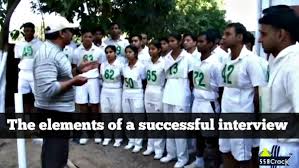Once you receive a call letter for SSB interview, many of you wonder what things you must do before going and how to prepare for this crucial interview. Apart from pursuing coaching classes, studying SSB books and gathering information from several resources, there are still many significant tactics you need to consider in this preparation phase. SSB is not just about your intellectual but more of a personality assessment test that does not expect you to give predetermined answers.
Many SSB aspirants also study psychological tests and then give a very common expected answer which is why there is a high chance of rejection.
Make sure not to provide fake answers, rather try to adapt some changes in your personality and reach upto the standards of an Armed Forces Officer.
Following are the 10 must things to do before going for the SSB interview to help you crack it effectively.
Prepare a Schedule: Make sure you frame a time-table where you systematically mention all the to-do-list mentioned below and perform them before going for the SSB interview. Try to follow this schedule strictly as much as you can.
Physical Health: Take out half an hour in the morning for physical exercises and also try to do some yoga. This will make your body more endurable and physically fit. Further, this will avoid rejection due to medical conditions. During SSB interview, the training days might go smoothly if you are physically healthy and happy. \
General Awareness: If you are not used to reading newspapers, make sure you start now. Read English Newspapers, make sure to take heed of both national as well as international affairs that are currently trending. Whenever you come across an unfamiliar English word, write it down and then note down its synonyms and antonyms.
Polishing your General Knowledge:Cannot emphasize this more but GK questions are also important in SSB interview. Do not underestimate this section. GK questions can be asked in the categories of current affairs, national news, International news, capitals of countries, ministers of countries, geographical knowledge, questions related to your interests or educational field, etc. Try to stay updated with the General Knowledge.
Gather Knowledge through TV:Fastest way to gain knowledge than newspapers, is the resource called Television. You can watch talk shows, debates, news, National Geographic Channel, Discovery channel, political channel like Lok Sabha, etc. You will get more knowledge about current affairs through television as compared to any other source.
Work on your Communication and Public-Speaking Skills: In different tests of SSB like PPDT, Personal interviews, etc. your communication and public-speaking skills will be tested. How well can you communicate under pressure, how confident are you in your responses, how is your behavior during Group discussions, everything will be monitored by the examiners. Before appearing for the interview, it is very important for you to work on your communication as well as public-speaking skills, especially when you have a shy personality. For this, you can try to arrange mock group discussions, go through mock interviews, practice different tests and arrange sessions to talk in front of the audience as well. Focus on correcting your pitch, volume, language and rhythm of speech.
Sports: Being good at sports and having proper knowledge about how it works is really considered significant in SSB. Certain questions might be asked regarding your favorite sports. And having interest in sports activities will also create a great impression on SSB examiner. Prepare for at least 2-3 sports and have some basic general knowledge regarding them. Sports will increase your endurance greatly and also enhance the quality of your PIQ. (Personal Information Questionnaire).
OLQs (Officer-Like Qualities): Not just faking during SSB interview, but start to inculcate values in your daily life before you appear for SSB interview. It will help you to naturally bring out your personality during the interview, rather than falsifying it. OLQs include courage, honesty, intelligence, expressiveness, confidence, etc. Hence, try to inculcate these values in your daily life and train your mind to think and act like an Armed forces officer.
Logical Reasoning: Go through several logical reasoning tests like verbal, non-verbal and other reasoning play offs so that your brain gets more active and alert. These logical reasoning tests force your mind to work and think in a certain way. And so, you will be more attentive and focused during the actual SSB interview as well.
Practice Optimism: One thing that will certainly get you rejected in an SSB interview is a pessimistic approach. Whenever you are asked certain questions or put through certain situations in SSB interview, examiners are trying to figure out your personality assets. If your overall behavior comes out to be pessimistic, you are more likely to get rejected in the tests. Always try to stay positive and have an optimistic approach towards things. It won’t happen magically in the SSB interview but you have to practice positivity and bring those vibes into your life before you appear for the interview. Eventually, this will boost your confidence and portrait your personality better.
Work on your personality assets thoroughly, rather than practicing TATs and other such tests, because once you get selected, there’s no story writing or word sentencing into picture. Apart from all the above-mentioned to-do-things, I would also suggest you to learn the technique of PIQ form filling. Avoid stating unnecessary and inappropriate details, rather state authentic facts.
Not just that, also read your resume properly, dress up neat and tidily for the interview. Being optimistic does not mean that you to behave very casually during the tests or personal interview. Sit straight and portray mannerisms through your behavior that shows you are serious about getting selected into Armed Forces of India. Moreover, avoid having a cynical approach, unfriendly behavior, too much stammering/stuttering, faking answers or trying to paint a false picture, etc. Be honest, sincere, confident and cheerful in your behavior as well as appearance.
